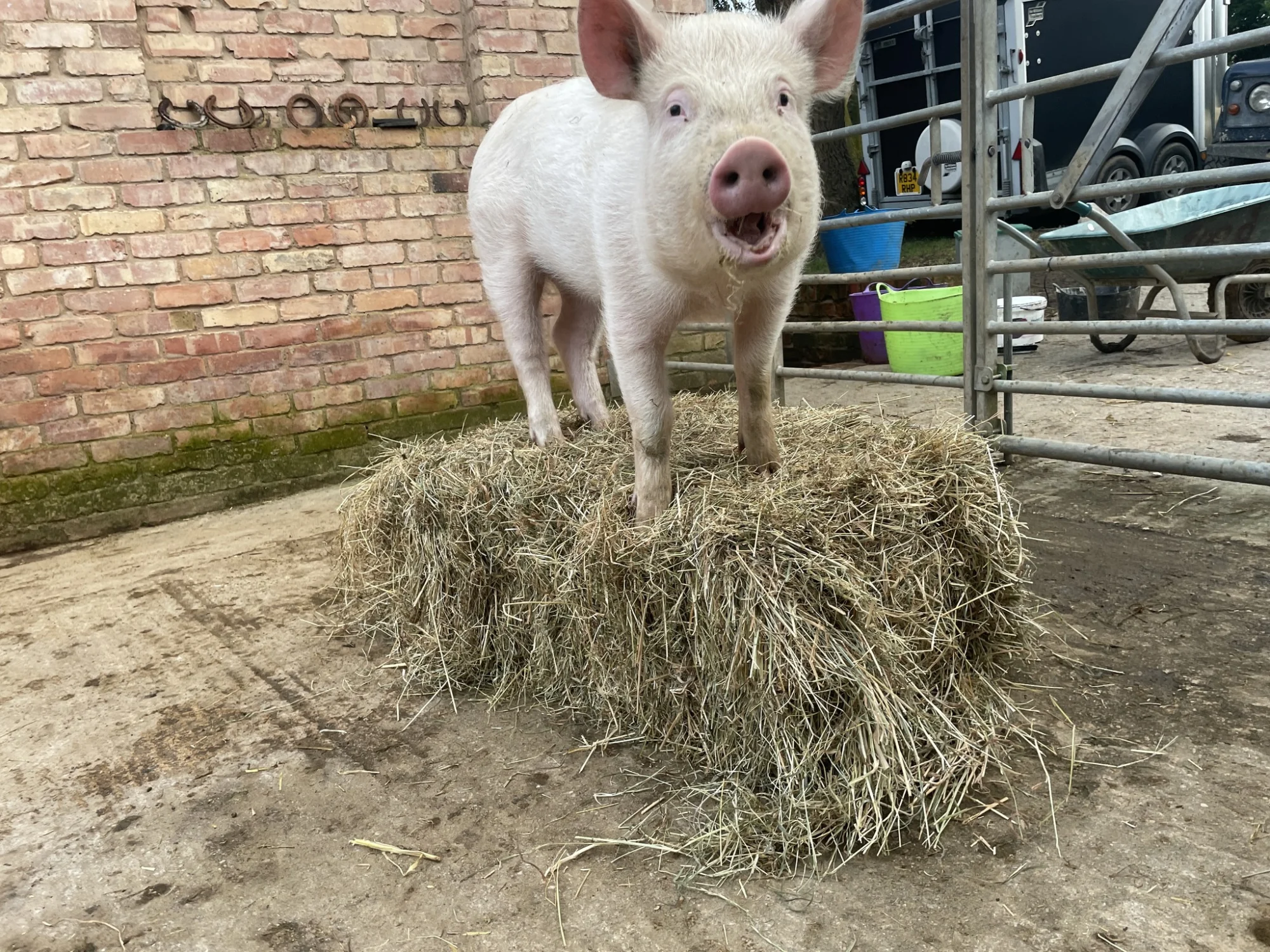
Pigs do make amazing pets, they are highly intelligent, sociable and very clean, they are relatively easy to care for, provided that you have done your research and can provide for their specific needs. Sadly too many people buy pigs from breeders without doing their research and soon realise they can’t cope or give the pigs a good home, that’s when we cane the call.
We turn pigs away far too often, we are always full and can therefore only take in animals as we create space by rehoming the ones we have.
Do your research and if pigs are for you and you can provide for their needs, you’ll love them.
Considerations Before Offering a Home to Pigs
Behaviour – As pigs are highly intelligent social animals, they need company of thier own species, never solitary. When available,
they will use specific areas for dunging, exploration and sleeping. It is important that pigs have sufficient space
to allow them to make these separate areas. Being highly inquisitive, pigs will spend a large part of the day
exploring their environment, rooting and foraging at the earth, causing the land on which they are kept to be
greatly disturbed with all visible signs of vegetation quickly disappearing. Straw, hard plastic balls and tyres
can be placed in the pig pen for the pigs to play with, encourage exercise and prevent boredom. Pigs must be
exercised regularly to avoid obesity, constipation and prevent their feet from becoming overgrown.
Very strong fencing – even small pigs easily smash their way through normal garden fencing. We recommend post and netting. The fencing doesn’t need to be too high, but certainly strong. Electric fencing is no good, pigs are far too intelligent and will soon get through it.
Sufficient Space – They are very intelligent animals and need a large area to roam around and receive stimulation. If they are confined to a small area, they will get bored and can become destructive and even aggressive. A pair of pigs would need at minimum a 10m x 10m area.
Companionship – Pigs are highly sociable creatures, they must never be kept on their own, they must be in groups of 2 or more.
Castrate – Boars must be castrated as soon as they are old enough, not only does this prevent more unwanted pigs in this world, it should prevent the males from become aggressive to you and other pigs.
Diet – A good diet includes pet pig food such as Allen & Page, they also love fruit and vegetables including bananas, apples and most kinds of fruit & veg. Never give your pig cheaper commercial pig food, ensure its for pet pigs. Commercial food is designed to fatten up pigs fast to be killed for meat, you do not want you pet to become obese. Keeping your pig’s weight in check, by providing the correct diet and adequate opportunities for exercise, helps to reduce the problems caused by arthritis.
Shelter – As pigs are very poor thermo-regulators, meaning they have great difficulty keeping cool in summer and warm in winter, your piggy’s need sufficient and strong draught free, dry shelter such as a pig arcs and provided with clean straw bedding, they need to get out of rain, wind and direct sunshine.
It is important to ensure that pigs are not exposed to draughts, sudden temperature changes and prolonged exposure to sunlight. It is very important to ensure that in warm weather pigs are provided with a wallow (with clean water) and adequate cover to shelter from the sun (pigs are prone to sunburn and sun stroke)
Indoor Pigs? – Pigs can be come indoors and can be even be house training, however they need lots of space and should therefore live outdoors in large areas. If they are confined to an indoor area, prepare to have your house destroyed. Pigs can be quite destructive, they will soon turn a lawn into a mud bath, they can rip up carpets and even pull doors off kitchen cupboards to get to food.
Movement – Legally all pigs require a licence if they are to be moved from one set of premises to another domestic dwelling to an animal home or veterinary surgery! They cannot be moved again to other premises for a period of at least 20 days.
Health and Veterinary Care – You will need to have your pigs registered with an agricultural vet practice so that they will attend for routine health checks, vaccinations and worming. Also should your pigs become unwell, you will need a vet out promptly, you cannot take a pig to the vets. Pigs must have regular health checks from a veterinary surgeon. It is wise to consider vaccination against diseases.
Pet pigs are prone to several specific health problems:
- Pigs can suffer from dry, scaly skin. Baby or vegetable oil can be rubbed on the skin to reduce the dryness. If the skin is crusting, causing scratching, the animal should be checked for mange.
- Sunburn is a common problem in pigs. Shade must always be made available.
- Pot-bellied pigs can suffer from inverted eyelids. This causes the hairs on the eyelid to irritate the outer surface of the eye (the cornea) and can develop into conjunctivitis. Action needs to be taken, so a vet must be consulted.
- Arthritis and lameness can be a problem especially in older animals. Feet should be regularly checked to ensure they are not becoming overgrown and foot trimming carried out if necessary.
